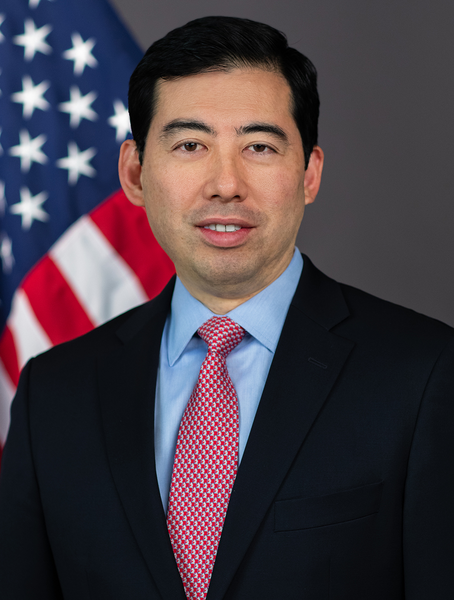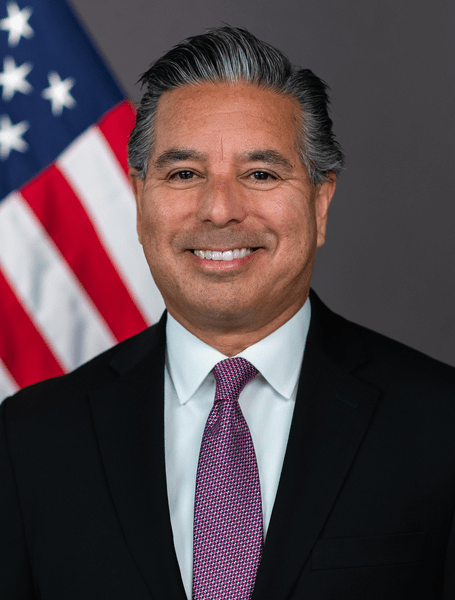SEC Trading and Markets Division recommends changes to clearing agency rules – May 17, 2023
On Wednesday, the director of the SEC’s Division of Trading and Markets, Haoxiang Zhu, said that his department has recommended the SEC propose two new changes to the rules applicable to covered clearing agencies.

Photo: SEC
The changes would provide that the margin system must monitor intraday exposure and have procedures that would apply when substantive inputs (such as details about portfolio size or volatility) from third parties to calculate margin are not readily available or reliable, Zhu said.
Elizabeth Fitzgerald, the Assistant Director of the Division of Trading and Markets, Office of Clearance and Settlement, spoke after Zhu and explained the proposed rule changes in more detail.
The changes would apply to Exchange Act Rule 17Ad-22, which encompasses the Covered Clearing Agency Standards, and they would propose a new Rule 17Ad-26, which would build upon an existing requirement in Rule 17Ad-22, she explained.
First, the recommended proposal would build upon and strengthen the existing requirement in Rule 17Ad-22 that a covered clearing agency have policies and procedures reasonably designed to cover its credit exposures to its participants by establishing a risk-based margin system that, among other things, includes the authority and operational capacity to make intraday margin calls in defined circumstances.
Specifically, the proposed amendments would require that a covered clearing agency’s risk-based margin system monitor intraday exposure on an ongoing basis and include the authority and operational capacity to make intraday margin calls as frequently as circumstances warrant, including when risk thresholds specified by the covered clearing agency are breached or when the products cleared or markets served display elevated volatility.
Third-party inputs
Second, the recommended proposal would amend and expand the requirements that a covered clearing agency have policies and procedures that would apply in the event that the covered clearing agency relies on substantive inputs from third parties to calculate margin and, specifically, when such inputs are not readily available or reliable.
“This proposal would require that the procedures used in such circumstances must include substantive inputs from an alternate source or, if it does not use an alternate source, the use of an alternate risk-based margin system that does not similarly rely on the unavailable or unreliable substantive inputs,” Sullivan said.
Finally, the SEC is proposing to prescribe requirements for the contents of a covered clearing agency’s recovery and orderly wind-down plan.
Currently, the Covered Clearing Agency Standards require that a covered clearing agency’s policies and procedures include a plan for recovery and orderly wind-down, but does not establish requirements for specific elements to include within those plans.
Nine elements
The new rule would identify nine elements that a covered clearing agency would be required to include in its plan and would also include definitions of “recovery” and “orderly wind-down” which would identify the objective that these plans are designed to meet.
She outlined the nine elements, which include covered clearing agencies identifying and describing the criteria that could trigger the implementation of a recovery and orderly wind-down plan, plus the rules, policies and procedures it would use in a such a recovery or orderly wind-down.
The public comment period will remain open for 60 days following publication of the proposing release on the SEC website, or 30 days following publication of the proposing release in the Federal Register, whichever is longer.
Investing in foreign issuers and regulating foreign entities – May 16, 2023
On Tuesday, speaking from Paris, SEC Commissioner Mark T Uyeda kicked off the first Global Summit for the Managed Funds Association in the European Union.

Uyeda noted the increase in US interest in international investments, saying the SEC should be respectful of the differing regulatory regimes developed by foreign jurisdictions.
“The mere fact that US investors seek opportunities across the globe does not mean that the SEC should impose its regulations and enforcement authority around the world. Since US investors benefit from investing in – or receiving investment advice and financial services from – foreign entities, any effort to extend US laws and regulations to these entities must be appropriately calibrated,” he said.
He said the SEC historically has been careful not to apply its rules to foreign entities that have minimal contact with US markets and has previously avoided rules based on mere theoretical concerns.
Uyeda lamented, though, that given the SEC’s recent actions affecting foreign entities, it is clear that times are changing.
He said the SEC’s deference to foreign regulatory regimes is slowly being replaced with an approach that favors the primacy of US regulations.
“The mere fact that US investors seek opportunities across the globe does not mean that the SEC should impose its regulations and enforcement authority around the world.”
Mark T Uyeda, SEC Commissioner
Examples Uyeda mentioned were the SEC’s recent amendments to the disclosure requirements for share repurchase, as these amendments will apply to foreign private issuers and domestic issuers alike, and for the first time, foreign private issuers will be mandated to make quarterly filings with the SEC. (Uyeda dissented from certifying those amendments earlier this month, saying they would effectively sacrifice principles of mutual recognition and international comity.)
In addition, Uyeda noted that the SEC has proposed a rule to impose prescriptive requirements on private fund advisers. The proposal would prohibit private fund advisers from engaging in certain sales practices, conflicts of interest, and compensation arrangements and require private fund advisers to obtain annual financial statement audits.
“The exemptions from US securities laws that foreign entities rely on are premised on the understanding that there is a threshold below which the US should defer to foreign regulators under the notions of equivalence and convergence,” he said.
Cybersecurity and AI – May 16, 2023
In a speech on Tuesday at the Digital Directors Network 2023 Conference in Chicago, SEC Commissioner Jaime Lizàrraga spoke about the efforts his agency is taking in the cybersecurity arena – and those the regulator expects from the organizations it oversees.
He noted how the US capital markets are nearly $100trn in size – representing 40% of the world’s total – and process over a trillion dollars of transactions per day. In light of this, he said, it is critical that regulators, law enforcement and institutions do everything in their power to strengthen cyber practices, so that financial markets can be more resilient and so investors can be protected.
He reminded us that the SEC has issued five rule proposals to require issuers, funds, intermediaries, self-regulatory organizations, and other registrants to adopt and implement effective cybersecurity policies and procedures, including:
- disclosures to the SEC and to the public about significant cybersecurity incidents and risks;
- notification to customers if their personal information is compromised; and
- more robust cybersecurity practices for certain significant market infrastructures and key market participants, including enhanced oversight of cloud service providers.
These would include recordkeeping requirements to facilitate examination for compliance and identification of any deficiencies.
“Although the full implications of AI for our financial markets, and for the retail space in particular, are unclear, it is essential for the Commission and for market participants to stay ahead of these developments.”
Jaime Lizàrraga, SEC Commissioner
As part of this package of proposals, the agency is updating Regulation S-P, referred to as the “safeguards rule.” The SEC’s proposed update to it would require financial firms covered by the rule to notify individuals if their sensitive information is compromised in a data breach.

Photo: SEC
The SEC has also recently proposed amending Regulation System Compliance and Integrity, or Regulation SCI. As proposed, this updated rule would cover additional entities, such as registered security-based swap data repositories, large broker-dealers, and certain exempt clearing agencies.
The goal is to ensure that these entities are treated similarly to entities that perform those functions for other asset classes, such as equities.
Lizàrraga said that artificial intelligence (AI) and emerging technology more generally raise important questions about possible risks to our financial markets. He said the technology has the potential to increase access, efficiency, and returns – but could also be used by market insiders to place their own interests ahead of their clients’ or by criminals seeking to manipulate stock prices or defraud investors.
“Although the full implications of AI for our financial markets, and for the retail space in particular, are unclear, it is essential for the Commission and for market participants to stay ahead of these developments and, where appropriate, to take the necessary actions, including through updating our rules, so that investors can be fully protected from any risks,” Lizàrraga said.













